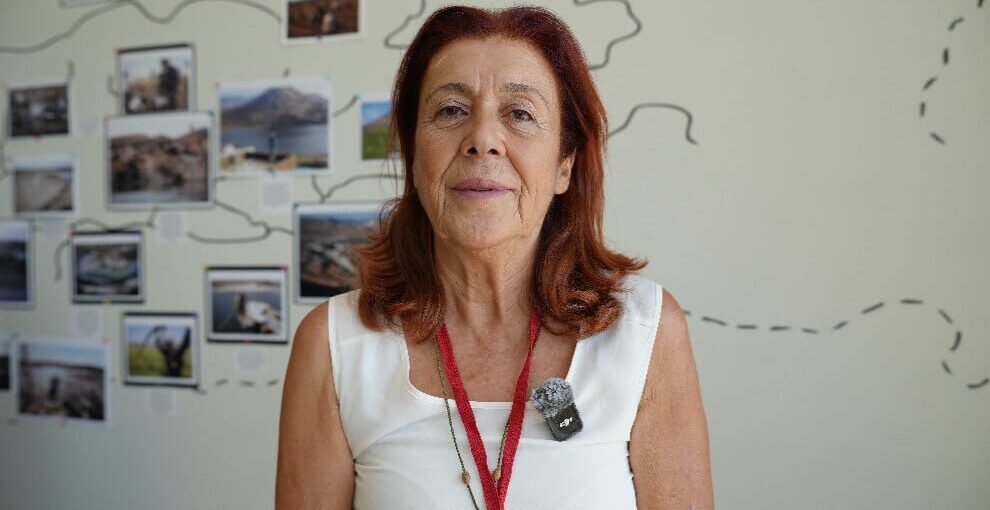Ecologist Beyaz Üstün said that the global climate crisis is in fact a water crisis and warned that if it is not stopped it will lead to greater disasters.
The 2nd Mesopotamia Water Forum, organised by the Amed (Diyarbakir) Metropolitan Municipality, the Mesopotamia Water Forum and the Mesopotamia Ecology Movement, has begun. Over the three-day forum, discussions will address not only the water resources of Mesopotamia but also the water crisis and related policies in Iran, Iraq and Syria. The forum, which includes participants from the Middle East, Turkey and UNESCO, will also seek solutions to the policies of the capitalist system that has turned water into a tool of war.
Ecologist Beyza Üstün, one of the participants of the forum, drew attention to the deepening attacks on water resources and capital-driven policies particularly in the lands of Mesopotamia. Üstün said: “Water is liberated together with peace,” and added that water, once disconnected from its natural flow, has turned into a crisis and that a struggle must be waged against this.
Üstün said at the second Mesopotamia Water Forum that water policies in the region threaten both nature and societies and reacted to the transformation of water into an instrument of capital accumulation. She stated that the reason for bringing together the peoples of the Mesopotamian basin, ecology organisations, activists, politicians and researchers in this forum is to “defend water and life,” adding: “We are here as those who care about water policies and those who want to protect water.” She underlined that this process is not only an environmental struggle but also a political and social one.
The Mesopotamian basin is under a deep assault
According to Beyza Üstün, water policies in the Middle East are undergoing a profound transformation, particularly through Western Mesopotamia. The efforts of the capitalist system and nation-states to control water resources directly threaten life in the region.
Üstün said: “The capitalist system, backed by imperialism, imposes international decisions on nation-states. In this process, natural assets, ecosystems and fundamentally water, which is the source of all living beings, are being commodified.” She recalled that the decisions taken at the 1992 Dublin Conference removed water from being a human right and turned it into a commercial commodity.
Water has been cut off from its natural flow
Üstün stated that the water policies implemented in Turkey and neighbouring riparian countries have long been destroying nature and added: “Through dams, energy projects and investments by large corporations, water has been cut off from its natural flow; the common asset of peoples, living beings and entire ecosystems has been turned into part of capital accumulation.” She said the process is destroying not only water but also forests, agricultural lands and ecological balances: “When water becomes inaccessible, life also becomes inaccessible. Who has access to water? Only those with money and capital. State policies legitimise this.”
Water has become a war strategy
Beyza Üstün said that policies carried out through the control of water deepen regional conflicts, recalling the examples of Israel–Palestine and Rojava, and stated that water has now become a part of war strategies. Üstün said, “To seize water means to seize life, and this is a direct intervention in the lives of peoples,” and added that wars serve as instruments of capitalist and imperialist intervention.
We must struggle for all living beings
Üstün stated that in order to break this hegemony, it is necessary to resist capitalism, patriarchal mentality and capital-oriented interventions carried out under the pretext of security policies: “Today, as those who defend water, we are resisting this domination that invades every area of nature with mines, HEPPs, WPPs and SPPs, not only for our own lives but for all living systems. The purpose of this forum is to discuss ways to protect water and alternative forms of life against the system. We are not talking about controlling water but about controlling the system that interferes with water. We are discussing how we can sustain life without condemning it to the capitalist system,” she said, summarised the direction of the forum.
What we call the climate crisis is a water crisis
Beyza Üstün said that the crises experienced around the world are rooted in interventions in the water cycle.
Üstün said, “What we call the climate crisis is actually a water crisis. Because the water cycle has been disrupted, atmospheric balance has changed. Storms, droughts and floods are all the result of these interventions.”
Üstün stated that the conflicts created by wars and systems will now take shape around access to water: She said, “The real danger is the gap between those who can access water and those who cannot. No living being can survive in a world without water. For this reason, we are waging this struggle not only for people but for the continuation of life.”
Finally, Üstün underlined that the liberation of water is also the key to peace and said: “The liberation of water is peace. With peace, water is liberated and peoples liberate water. As subjects of this struggle, we come together here, we debate, and we seek our path together.”

